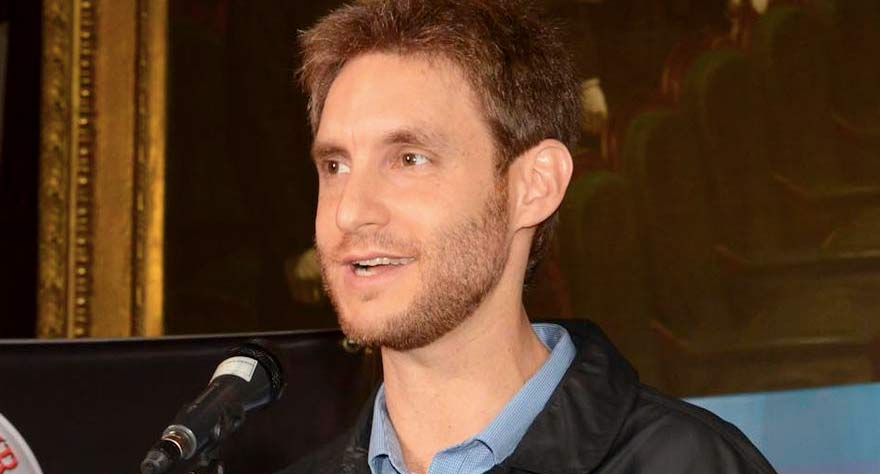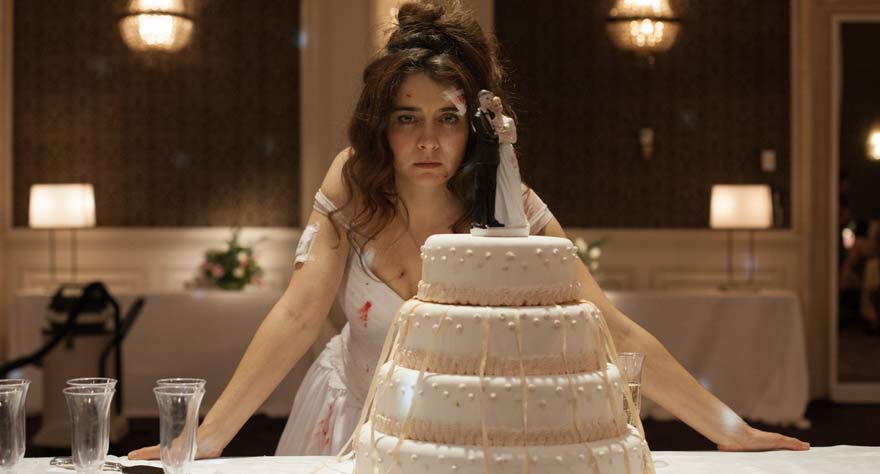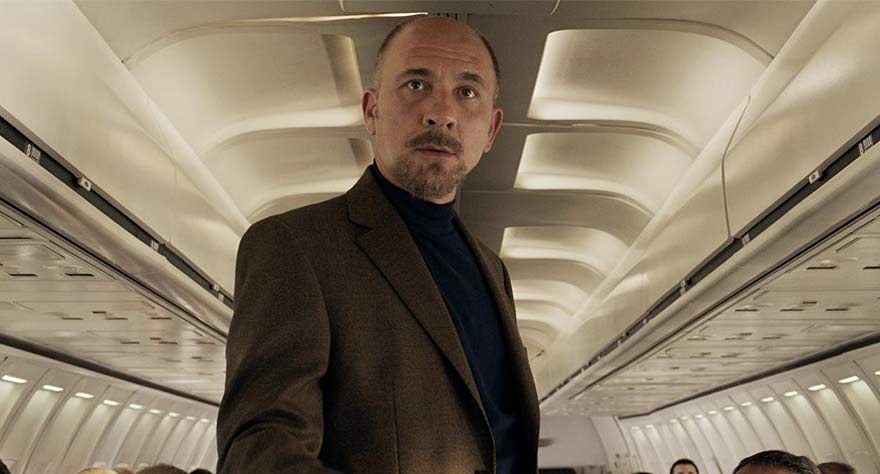Damian Szifron Talks About His Oscar Nominated ‘Wild Tales’, Hints At Sequel

After making a big impression at last year’s Cannes Film Festival, dominating Telluride in the fall, and earning an Oscar nomination in the Foreign Language Film category, Damián Szifrón’s Wild Tales finally gets unleashed on North American audiences this week. The Argentinian film, co-produced by Pedro Almodóvar, is made up of six disconnected and absolutely bonkers short stories. Szifrón avoids a lot of elements one expects from anthology films these days; no framing device, no wraparound story, and no narrative links between segments. In a way it’s a more refreshing take on the omnibus movie, since it makes it easier to enjoy each story on its own.
But look a little closer, and these Wild Tales are all connected to each other on a thematic level. Part of why the film seems to work like gangbusters with crowds is because of what Szifrón has tapped into with these films. Wild Tales deals with people taking out their anger on the parts of society that can drive us mad. Whether it’s an unforgiving bureaucracy, a rude driver, the privileged elite, or a corrupt politician, there’s something immensely enjoyable about watching someone let these people have it. You laugh at the absurdity, but you can’t help feeling a little wrong for living vicariously through these characters. Szifrón’s knowledge of what makes us tick (or, in this case, explode) is what makes Wild Tales such a fun experience (we already called it one of our favorite films of the year so far).
Back at the Toronto International Film Festival, we sat down with Damián Szifrón to chat about Wild Tales. Read on for the full interview, where Szifrón talks about the film’s influences, his extensive preparation in creating the visual language of the film, whether he’d want to make more wild tales in the future.
Wild Tales opens this week in limited release, so be sure to check your local theaters to see if it’s playing.
Usually anthology films have a different director handling each story. It’s rare to see one director handling the whole thing. Was it difficult to convince people to let you handle the entire film?
I have great producers, and as soon as they read the script they encouraged me to do it. They felt it was very fresh, unique and powerful, and the actors were extremely supportive. Without reading the script, [distributors] were afraid because there are so many anthology films that haven’t worked. That’s the reason why they have several directors, so no one is controlling the energy of the whole thing. But as soon as they read the script and understood the kind of film I was trying to make, they were very supportive.
You started working in television. Do you find it’s easier to work within the anthology format because you have a background in short form, episodic storytelling?
It might be. I always loved movies more than TV when I was a kid. The first thing I did was a TV show that I created, and that gave me a lot of tools. I would say that I’m not afraid of short form storytelling. I truly think of this film as a single experience, and I like all of these short stories together better than in different episodes. I think of it as a rock album with different tracks. It’s like a roller coaster of emotions, or a road trip where you’re stopping in different towns. I like that experience as a whole.
So if your film is like an album, how important was the sequencing? Did you put a lot of thought into what order you wanted to present your stories?
It’s the exact order I wrote the stories, but that just happened. I didn’t decide on it. I tried different orders, and after screening the film I realized it was the natural order. I think there’s something that works on a subconscious level, so when I was writing one short I had to up the ante for the next one. It’s not that I wanted to be better, just different. One story takes the energy from the last one and transforms it into something else, so you’re still engaged and surprised. The change has to be there. If they were all extremely loud, you’d get tired by the third or fourth tale.

Your stories feel very literary, like they could have easily been turned into short stories. Did you originally write these as screenplays?
I thought of them as screenplays, as material that would end up on a screen, but I don’t deny that there is something literary about them. Writing these projects connected me to the pleasure of reading and watching films more than anything else I’ve written.
So would you say your influences here were more literary or cinematic?
I can connect with the discovery of some books when I was a kid or a teenager, and the happiness that those books brought to me. Some of the happiness is because of their brevity. I liked the way these great authors could set up a story, a conflict, and develop it with only the [essentials]. I learned a lot about writing scripts while working on these short films.
When you were writing, did you notice the interconnected themes as you went along, or did you always intend to write about these specific ideas?
At first, I thought they were disconnected. When I had three or four of them written, I noticed they were all linked thematically. They all belonged to the same universe, and were a part of something bigger. It was not intended that way. I think that you discover the themes of what you write, the true themes, at the end of the process. You think you’re writing about one thing, but then you realize that you were writing about something else.
So was a lot of this a discovery process for you?
As a writer and director, yes.
What do you think drew you to these themes of revenge, catharsis and destruction?
Probably anger with some aspects of our society and our behavior, as well as the pleasure in letting loose through these characters. In life, you must repress yourself if you don’t want to end up in jail or die, so you can’t fight everything that you want to fight. But the cost of repressing is high. It’s better to stay alive, but you always think about what you should have said or done. Through screenplays and art, you’re able to no longer repress yourself. You can go to the very end of a situation and translate that experience to the audience. And I think the audience laughs at a lot at the film, even when there’s blood and suffering, because they understand the pleasure and desire of reacting, of not repressing.
A lot of your stories have class relations built into them as well.
I spent a lot of time writing a science fiction trilogy before Wild Tales, and I think that thematically that science fiction trilogy concentrates on how this whole system works. Who are the beneficiaries? Who is it for? What are the causes and consequences, and how could it be changed? Wild Tales is more about the people that live in the system, but it doesn’t have a conscience about the system’s design. It’s not a grand statement. It’s just about the people. In a modern city or country, a lot of people get stressed or depressed, and a few people explode. This is a film about them.
Every time I read in a newspaper that somebody did something absolutely crazy and terrible, like self-immolation, I never think of them as someone with serious mental issues. I’m sure they have some [mental issues], but I always think of them as human beings, and how this world can drive some people to do such terrible behavior.
There’s no narrative tissue between these films. Did you ever have the urge to create some sort of connection?
I thought of it, but more because I was afraid of the audience not connecting to the stories as a whole. They were born as separate stories that are linked thematically. That’s the nature of the film, and ultimately I tried to respect that. It would have been very easy for me to invent a character that comes from one story to another, or have a falcon flying around the scenarios and watching them. I think that would have hurt the film. One of the pleasures of the film is that they are separate stories. I like the cuts from one story to another. Again, like an album. I like that one song ends, and another begins.

You had a lot of shots where you attached the camera to a moving object.
It became the language of the film.
I wanted to know how you developed that language for the film.
While working in TV, I got used to shooting one episode while writing and editing another, so it was natural to me to decide on set. I learned how to do that, and I think I can shoot anything by just arriving on set and choosing where the camera goes to tell the story. At some point I felt like it was not a tool but a defect. As a filmmaker I wanted and needed to spend a lot more time [deciding]. I think I saw an interview with Spielberg on TV where he said preparation is all, and that he had to know exactly what to do and think about it a lot. That, plus my own experience, made me want to have a lot more time to prepare as a director.
So when I shot this film I stopped writing what I was working on at the time. I only spent my time directing. I went to the locations by myself, and I often slept on locations. I wanted to feel like the characters, to be them from the inside. That’s how some of these ideas came up, like putting the camera in the very place that’s needed to make the situation more interesting and powerful. After that, I met an amazing key grip named Ariel Vélez. I think he’s a genius. I told him where I wanted to put the camera, and he said yes to everything. I knew I could dream of anything, and he would know how to do it without harming the camera. I think that my relationship with him and [cinematographer] Javier Julia allowed me to be freer.
Have you considered more Wild Tales?
I have more tales already written. I think I could do a sequel. I could call it Wilder Tales or More Wild Tales, but these tales are wild enough. The short form is a discovery, and I actually enjoyed doing this. It’s not what I’m going to do next, that’s for sure, but I would like to make another anthology. For example, Love Tales, or something like that. I don’t have the need, but if I feel like it, I will do it.
